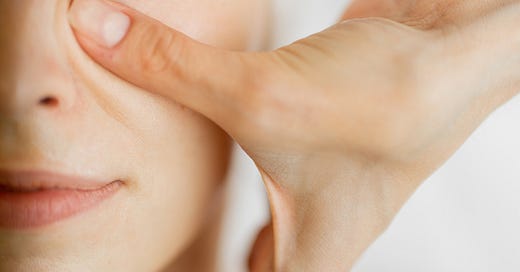What is going on with my skin?
This is a common question thrown my way. In order to answer that question, one needs to understand their skin, then you can build your routine around it. This gives you a solid understanding of your specific skin type and how you can support it!
To create an effective skincare routine, it's essential to understand your skin type and how it functions. Let’s dive into skin anatomy, discuss the five main skin types, and explain how to determine which one you have.
Skin Anatomy
The skin is the largest organ of the body, covering an average area of about 20 square feet and weighing approximately 8 pounds. It serves multiple functions, including protection, temperature regulation, sensory perception, and vitamin D synthesis.
The skin consists of three main layers:
Epidermis: The outermost layer of the skin, which acts as a protective barrier against environmental factors, such as UV rays, pollution, and bacteria. The epidermis is also responsible for skin cell turnover and regeneration.
Dermis: The middle layer of the skin, which contains collagen and elastin fibers that provide structure, support, and elasticity. The dermis also houses blood vessels, hair follicles, and sweat glands.
Hypodermis: The deepest layer of the skin, also known as the subcutaneous layer, which is primarily composed of fat cells. This layer helps to insulate the body and provides cushioning for the skin.
Understanding the functions and interactions of these skin layers helps in appreciating the skin's complexity and how different factors can impact its health and appearance.
Different Skin Types
Skin types can vary significantly from person to person, influenced by genetics, environmental factors, and lifestyle. The most common skin types include:
Oily Skin: Characterized by excessive sebum (oil) production, often resulting in enlarged pores and a shiny complexion. Oily skin is prone to acne and blemishes.
Dry Skin: Lacks sufficient natural oils and tends to feel tight, rough, or flaky. Dry skin may be more prone to irritation and fine lines.
Combination Skin: Exhibits characteristics of both oily and dry skin, with an oily T-zone (forehead, nose, and chin) and drier cheeks.
Normal Skin: Well-balanced skin with adequate oil production and minimal sensitivity. Normal skin typically has a smooth texture and even complexion and tone.
Sensitive Skin: Easily irritated by environmental factors, skincare products, or certain ingredients. Sensitive skin may experience redness, itching, or burning sensations.
Identifying your skin type is crucial for selecting appropriate skincare products and treatments tailored to your skin's specific needs.
Identifying Your Skin Type
To identify your skin type, start by washing your face with a gentle cleanser and patting it dry. Wait for about an hour without applying any products, then observe your skin's appearance and feel.
If your skin feels comfortable and balanced, with minimal oiliness or dryness, you likely have normal skin.
If your skin feels tight, looks flaky, or shows fine lines, you probably have dry skin.
If your skin appears shiny and feels greasy, especially in the T-zone, you have oily skin.
If you notice a combination of oily and dry or normal areas, you have combination skin.
If your skin easily becomes red, itchy, or irritated after using certain products, you may have sensitive skin.
Keep in mind that your skin type can change over time due to factors like age, hormones, climate, and lifestyle habits. It's essential to reassess your skin periodically and adjust your skincare routine accordingly.
Once you've identified your skin type, it's crucial to adapt your skincare routine accordingly. Using products that are not suitable for your skin type can lead to various issues, such as excessive dryness, oiliness, irritation, or breakouts.
For example, if you have oily skin and use a heavy, oil-based moisturizer, you may exacerbate the oiliness and clog your pores. On the other hand, if you have dry skin and use a lightweight, gel-based moisturizer, it may not provide enough hydration, leaving your skin feeling tight and uncomfortable.
By tailoring your skincare routine to your specific skin type, you can ensure that your skin receives the right balance of ingredients, hydration, and protection it needs to look and feel its best. In the following chapters, we'll discuss the essential steps of a well-rounded routine and provide product recommendations for each skin type.
Common Skin Concerns
Many people experience common skin concerns that can affect overall complexion and confidence. Some prevalent skin concerns include:
Acne: Caused by clogged pores, excess oil production, and bacteria, leading to pimples, blackheads, and whiteheads.
Hyperpigmentation: Dark spots or patches caused by sun exposure, hormonal changes, or post-inflammatory processes.
Dryness: Insufficient moisture levels in the skin, resulting in rough texture, flakiness, and discomfort.
Fine Lines and Wrinkles: Signs of aging due to collagen and elastin depletion, sun exposure, and repetitive facial expressions.
Sensitivity and Redness: Reactive skin prone to irritation, redness, and inflammation triggered by allergens or irritants.
Understanding common skin concerns helps in developing an effective skincare routine tailored to address specific issues and promote skin health and vitality.
The next step….
Build Your Skin Care Routine!
Now that you've identified your skin type, it's time to build a skincare routine that will keep your skin healthy, radiant, and youthful. A well-rounded skincare regimen consists of five essential steps: cleansing, toning, treatment, moisturizing, and sun protection.
Let's dive into each of these steps and explore their benefits….stay tuned for part 2! Coming at you in the next few days!!
In the meantime, get a jumpstart on your skincare routine and support by booking a Holistic Facial with me! I am offering 15% off through the end of June. This is a great opportunity to get a deep dive into your specific skin care needs and get all those questions answered.
P.S. Did you know your skin is directly related to your gut health? Yup, we should talk! Book a complimentary nutrition consult to learn more about how I can help you with healing your skin concerns from the inside out!
P.P.S. Let’s have some fun, leave a comment and let me know your biggest skincare question! I will get it answered!





